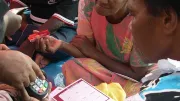Recent Blogs
Blog
Creative Partnerships Promote Rural Credit in the Andes
The competitiveness and sizable growth of microlending in the Andean Region can be largely attributed to the favorable regulatory framework, but the creativity of the stakeholders in the industry has been an important factor as well. The supervisory authorities in the region’s financial sector have recognized the importance of microlending in the promotion of financial inclusion and have gradually created an environment that has been open to creativity and has enabled the different players to come up with financial services for previously underserved populations in rural areas.Blog
Delivering Technology Solutions to Susu Collectors
Susu collectors are one of the oldest financial services in Africa. Based largely in Ghana and Nigeria, they visit clients on a regular basis (often daily), collecting very small deposits over the course of a month. This post examines a Ghanaian susu solution which involves a POS device which prints a receipt for the customer and transmits the information back to the susu company’s home office IS system for real-time reconciliation.Blog
What Is the Role of Start-Ups in Financial Inclusion?
This post explores the role of start-ups in financial inclusion by highlighting some of the themes from the recent Finovate event.Blog
Consumer Lending and Overindebtedness in Latin America
In Latin America household debt levels have been rising in recent years. Increased consumer debt level can in part be expected with growing economies. However, in several markets these debt levels may be leading large groups of consumers towards overindebtedness, and could pose a risk to economic growth, household well-being, and financial institutions with significant levels of consumer debt in their portfolios. This post examines some interventions underway to better understand the phenomenon of consumer lending and its implications.Blog
Scammed: Pyramids and the Financial Inclusion Agenda
Large-scale financial crimes such as pyramid and ponzi schemes that promise high returns on dubious investments are always big news. Clearly they can lead to devastating losses for consumers, the great majority of whom typically lose all the money they invest. This in turn can threaten gains in financial inclusion by eroding potential new consumers’ confidence in the formal financial system.Blog
The Need for Financial Inclusion Success Stories
Next week, policymakers and regulators from more than 80 countries will meet in South Africa to update each other on progress they have made to advance financial access for poor households and small enterprises.Blog
Green Finance: Bridging the Gap
There appears to be a fundamental gap in the discourse on climate change between developed countries and developing countries. In the international arena, developed countries have directed most action, resources and efforts towards climate change mitigation. For developing countries, the very present adverse effects of climate change result in a central role of adaptation initiatives, actions that people, government and businesses can take in response to or in anticipation of foreseeable adverse changing climate conditions.Blog
We Have Moved...
Yesterday, we announced the launch of the new CGAP.org site and with it the migration to our new blog. This new consolidated platform will make it easier for our readers to find out what’s happening in the world of financial inclusion taking advantage of an improved integration with our social media channels, including LinkedIn, Twitter and Facebook. Curious about responsible finance or how to drive customer adoption of branchless banking? You can now find everything you need to know about financial inclusion in one place.Blog
My PIN Is 4321
PIN sharing is recurring problem amongst mobile money users. However, providers should realize that when people do something with a product that they are not intended to, the reaction shouldn’t be “educate!” but rather to see what about the product can be changed to accommodate the behavior of the customer in a better way.Blog
Banana Skins 2012: Improving MFI Governance
This year’s Microfinance Banana Skins is aptly titled “Staying Relevant.” The fourth in the series, each year the Banana Skins report reflects not only the perceptions of industry actors but stands as a commentary on the evolution of the microfinance sector itself.Blog
The Growth of Mobile Financial Services in Bangladesh
In early 2010, we blogged about the steps identified for mobile financial services to take off in Bangladesh. Bangladesh has moved partly down this path. A newly released overview report on Mobile Financial Services by Bangladesh’s Central Bank highlights the progress achieved two years on.Blog
Understanding Financial Needs of Urban Migrants
A CMF-IFMR report (Nandhi 2011) shows that while 95% of 176 interviewed Rickshaw pullers reported to save small amounts, most of them do it without any formal bank account.Blog
Are Lower-end Shops Ripe for Electronic Payments?
Are payment dongles like Square democratizing retail electronic payments by eliminating the need for dedicated point-of-sale terminals. Is the growth curve of Square an indication that similar low-cost acquiring solutions could trigger an explosion of merchant payments in developing countries?Blog
Training MFI Directors on Governance
Some MFIs do have informed and knowledgeable board members who lead the institution and take decisions and actions to define the organization’s mission, establish policies, and determine control mechanisms to allocate power, establish decision making processes and set up procedures for performing specific tasks.Blog
Are You Getting Your Share? Revenue Protection in Mobile Money
Mobile money has had bad press lately for fraud-related cases. Most of the reported cases were either the result of internal employees misusing the system to cause operator losses or fraudsters trying to scam unsuspecting users. There is another angle that rarely gets any press—when users or agents abuse the platform and use it in rogue ways that it was never intended.Blog
Happiness Up, Poverty Down
The benefits we’re seeing in the lives of the poorest are big and important. The results are strong evidence that the Graduation Model can work.Blog
Banking 100 Million Pakistanis
This post on a recent report on Interoperability provides insights on why interoperability might be important, how we should think about it from a policy and market development perspective and how it should be measured, especially as it relates to financial inclusion.Blog
Have You Looked Poverty in the Eye Lately?
Beyond a chance meeting, what are the ethical responsibilities of development professionals when staring poverty in the face?Blog
Towards Behaviorally-informed Financial Consumer Protection
Behavioral economics is the science of human decision-making and how people’s biases and weaknesses can lead them to make harmful economic decisions.Blog


